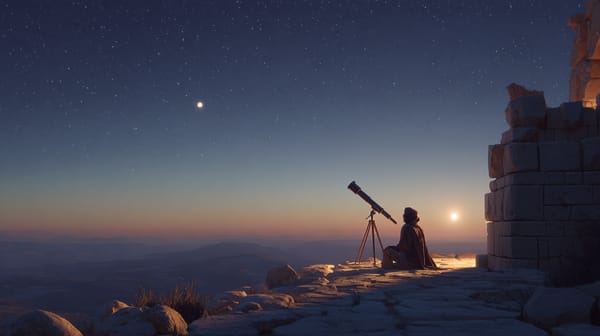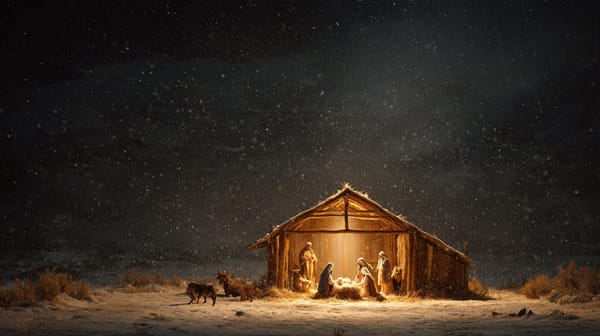Fairhaven Sermon 5-18-2025

Summary
In this week’s service, Rev. Peg Bowman explored the themes of hope and renewal, drawing from readings in Revelation, Acts, John, and Psalm 117. Focusing on Revelation 21:1-6, she emphasized that the "end of the age" isn’s about fiery pits and battles, but rather a vision of a new heaven and a new earth where God dwells among people, and there will be no more death, mourning, or pain. Bowman cautioned against interpreting Revelation as a literal timeline and instead highlighted its message of comfort, encouragement, and God’s promise of a restored earth where all people from every nation will live together in peace.
Bowman further connected this vision to the readings from Acts and John, explaining that God’s plan from the beginning has been for all people to know and love God, and that the wall separating Jewish and Gentile believers has been broken down. She stressed that anyone who believes in Jesus and receives the Holy Spirit is a brother or sister in Christ, and challenged the congregation to embrace this inclusivity and love one another as Jesus has loved them, looking forward to the fulfillment of God’s promise of a world renewed.
Transcript
All right, so today is the fifth week of the Easter season, as well as being Aldersgate Sunday, and our scriptures are still talking about the meaning of Jesus' resurrection, both for the early church and for us today. The scripture readings we just heard today are from the book of Acts and the Gospel of John. And both of them sort of take a step back into the days before the resurrection. And we'll talk about those readings.
But we also have for the fifth Sunday of Easter, a third reading. In fact, every Sunday we have three readings of which we only do two. In this case, I thought the third reading also applies if it goes well with the other three. And here's from the book of Revelation.
And I wanted to include that into the mix. And here's why. There have been times, we're speaking of history, in American history, and in world history as well, when people have just all of a sudden gotten really fascinated with the book of Revelation. And I can remember the last time it happened here in the States.
My brother and I were both in college at the time, and people were talking about revelation literally everywhere. I mean, I remember people debating it over the lunch table at work. I can remember my brother and his then girlfriend, now ex-wife. having a banner across the top of their living room wall, showing the events in the book of Revelation in the order in which they were supposed to happen and showing just how close to the end we really are.
We're in one of those times again now when people are... talking about Revelation.
I've been hearing it wherever I go, and I see people pulling out those lists again and checking off what's happened so far. So when our list of readings offers me a chance to talk about Revelation, I wasn't going to pass it up. One of the things I learned about Revelation in seminary is that this book was not meant to be a timeline for the end of the age. It does describe some of the events of the end of the age to some extent, but not in any particular order and certainly not on a timeline.
The book of Revelation is first and foremost a letter to It's a letter that was written to the churches of the first century after Jesus' resurrection. It's written to give direction and comfort and encouragement during difficult times. When John wrote the book of Revelation, he was writing a letter to the churches who were under persecution. from the Roman Empire, and who were also experiencing false prophets internally, that is, people coming into the churches and teaching things that Jesus never taught, and sometimes they were teaching the opposite of what Jesus taught.
So seeing a combination of external pressures and internal pressures in the churches, John wrote the book of Revelation to give some words of correction, first off, which we see in the first few chapters, and then comfort and encouragement to the people of God with the knowledge that God was still with them, God was still in control, and God's word is still true. So. So, having all said all of this as background, I want to start off today's sermon by reading that passage from Revelation, and then we'll tap into the other two readings. This is Revelation chapter 21, verses 1 through 6.
It's close to the end of the book, and in this short passage, we actually do hear about the beginning of the end of the age, but it's not what people expect. Here we go. John writes, Then I saw a new heaven and a new earth, for the first heaven and the first earth had passed away, and the sea was no more. And I saw the holy city, the new Jerusalem, coming down out of heaven from God, prepared as a bride adorned for her husband.
And I saw the holy city, the new Jerusalem, And I heard a loud voice from the throne saying, See, the home of God is among mortals. He will dwell with them. They will be his peoples, and God himself will be with them. He will wipe every tear from their eyes.
Death will be no more. Mourning and crying will be no more, for the first things have passed away. As the one who was seated on the throne said, See, I am making all things new. Also he said, Write this, for these words are trustworthy and true.
He said to me, It is done. I am the Alpha and the Omega, the beginning and the end. To the thirsty I will give water as a gift from the spring of the water of life. That's the end of the age, as described in the book of Revelation.
There are no fiery pits, no beasts, no huge battles, no horsemen of the apocalypse. All those things, they all happen before we get there. When Jesus actually returns, the scene is a peaceful one. It's beautiful.
There's a new heaven and a new earth. Not that the old earth is completely destroyed, but it is renewed. The earth we know is not suddenly going to become something completely unfamiliar. And we're not going to leave it and fly up somewhere in the sky and float around on clouds or any of that kind of thing.
The earth we knew will be remade. the pollution will be gone. All the forests and the oceans will be restored. All the extinct animals brought back to life.
Not sure about the dinosaurs, but anyway, most of the animals will be brought back to life. The point is that God will make all things new. And the holy city, the New Jerusalem, is where God's people will live. The city contains people from all over the world, every nation, every continent.
And this is why the reading from Acts today is so important. And we're going to go there in just a moment. But staying in Revelation for just one more moment, the holy city of Jerusalem is described as a bride adorned for her husband, and Jesus is the husband. Amen.
The end of history as we know it and as we live it is going to be a royal wedding. The voice from heaven says, The home of God is among mortals. He will dwell with them, and they will be his people's. And this was God's plan from the very beginning, for God and people to live together in love.
That's what Genesis chapters 1 and 2 are about. God creating the earth and creating a people to live in a loving relationship with God. It's the whole story from the beginning of the book to the end. Two things therefore we can take as true from this passage.
Number one, if a person doesn't like God very much, they're not going to like eternity very much because God will be a part of everything in eternity. And number two, if someone doesn't like people from other countries or other races, they're not going to like eternity very much because God is making plans for all the people of the earth to be there. This is what eternity is going to look like, all of us together. No more tears, no more death, no more pain.
Now, speaking as a member of the partnership here, we have already seen a great deal of pain this year. In just the past five months, we have had people who have lost loved ones, have loved ones who are seriously ill. We've had people whose jobs are in jeopardy. and we bring these people to God in prayer, and we pray the best, we pray for blessings, but we also know that in this world before Jesus returns, that there are some illnesses that won't be healed quite yet, and there are some tears that can't be avoided, because we're still living in the old world.
But there is a new world coming, right here in the same location, with oceans and trees and cities and animals and people. We will not be sitting around on clouds with harps. And in this new earth, there'll be no more death, no more pain, and no more tears. That's the good news of the book of Revelation.
So if you happen to be overhearing people talking about Revelation, like I said, I've been hearing this a lot lately, tell them about this new earth. Tell them what God says in Revelation, that the real end of the age, we can trust God and trust Jesus, and there's nothing to be afraid of. Amen. So having said all of this, one of the next questions frequently asked is, well, who's going to be there and who's not? How do people qualify to live in this new world and how can we avoid missing it? And that's what our other two scriptures are about today.
So the reading from John, we go back to the night before Jesus was arrested, to the night when he washed the disciples' feet, Jesus is about to leave this earth, but not quite the way the disciples are thinking. And He says to them, I'm only with you for a little while longer, and where I'm going, you can't come. So where is Jesus right now? Today? Jesus is right now seated at the right hand of the Father, according to Scripture. He is still alive.
Now, does God's throne room have a physical location? Beats me. We don't know. The important thing, though, is that Jesus will be back, and when he comes back, the earth will be set right, the earth will be healed, and so will we. In the meantime, in our reading from John, Jesus leaves us with one commandment, just one: Love one another as I have loved you.
But none of us can love the way Jesus loves, and that's why the cross was necessary, to make up the difference, to make us whole, and to make us like Jesus. A Christian's ability to love others is taken to a whole new level by a relationship with God, and our call to love others is still as much in effect today as it was in the Gospel of John. Our ability to love others is related to our love for God and vice versa, and our love for God and others bears witness to the world of the truth of what Jesus taught. Pardon me.
So who's going to be included in this kingdom of God? Our reading from Acts answers that question. Acts tells the story of the first major disagreement in the early church. Peter had gone to visit a Roman centurion, and he ended up baptizing the whole family and eating with them, actually staying with them for a few days, And this was totally against what faithful Jewish people were taught to do. And the first Christians, of course, were all Jewish.
They had been raised with the Torah, the law of Moses, and the law said, among other things, that number one, all believers, and this, of course, is all male believers, had to be circumcised and this was a mark of the covenant between God and God's people. And number two, circumcised believers were not to eat with uncircumcised people. And this comes from the laws of purity. There were quite a few foods listed in the Old Testament that Jewish people were not allowed to eat.
And they couldn't risk the possibility of being served some of those foods if they ate in a non-Jewish household. But what happened over the years was that, as often happens when people are separated from each other, is that separate became unequal. And Jewish people believed that their way was better, they were the ones obeying God's law, They were the ones who were separate and clean, and many of them forgot that God's plan from the very beginning was that all the people of the earth would be blessed by and get to know God through the Jewish people. That was their calling from God.
And once Jesus was resurrected and returned to God's side, the wall between Jew and Gentile came down. And Peter describes what happened. He said while he was staying in Joppa by the seaside, Sea of Galilee, no sorry, not Galilee, Mediterranean Sea, gorgeous, and he saw a vision, a large sheet coming down from heaven with all the kinds of animals on it, many of them on God's list of things not to eat. And Peter heard a voice from heaven saying, Get up, kill and eat.
But Peter said, No way, Lord, I've never eaten anything unclean. And the voice from heaven answered, What God has made clean, you must not call profane. And this happened three times. Three, the number of completion, the number of the Trinity.
And immediately after the third time, three men arrived at Peter's door. They were Gentiles, servants of the Roman centurion, and the centurion was a God-fearer, and he had seen a vision of an angel telling him to send to Joppa for Simon, who is called Peter. He will tell you and your household how to be saved. And Peter, inspired by the vision he had just seen, went with those servants to the house of Cornelius, the Roman centurion.
Peter shared with the whole household, including servants and friends of the family. They divided the whole neighborhood into the house, basically. And while Peter was still speaking, the Holy Spirit filled every person listening, and they began to speak in tongues. And Peter asked his companions who'd come with him, If God gave them the same gift that God gave us when we believed, how can we withhold baptism? And so Cornelius' whole household and all their friends were baptized, and Peter and his companions stayed with Cornelius for a few days, including having meals together.
And that's the story that they brought back to the believers in Jerusalem. Scripture says the early church, the first believers, understood what God was doing and praised God. They did not let the old ways, their old traditions and their former divisions, get in the way of what God was doing. And the psalm we read a few moments ago calls on all people everywhere to praise God.
Verses 1 through 11, kings of the earth and all peoples, princes and all rulers of the earth, young and men and women alike, old and young together, praise the name of the Lord. Every nation, every people, no exceptions. The song of praise becomes a prophecy of what happens in Acts chapter 11. Amen.
And what happened in Acts 11 still happens today. Anyone, anywhere who believes in God and trusts in Jesus and has received the Holy Spirit is our brother or our sister in Christ, no exceptions. And I believe that this is one of the greatest blessings that God has given us. That's each other.
Believers in Jesus can be found around the globe, in Africa and Asia, Europe and Australia, South America, North America. The more people we meet, the more places we know, the bigger our God gets, at least that's how it feels. We know from stories and hopefully from experience that God has placed our brothers and sisters in faith everywhere around the world. We share not just humanity, but we also share God's Holy Spirit.
And in God, we are one. um All these people from every time and place will be with us when the words of revelation come true. Jesus said to His disciples on His last night with them, Love one another as I have loved you. When we do this, we begin to catch a glimpse of the future that Revelation describes, a new heaven and a new earth, where God lives with us all and wipes away every tear from every eye.
This is God's promise. This is the world that is coming. Amen.



